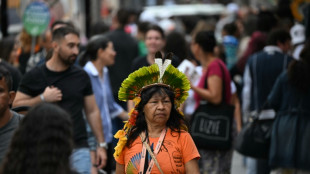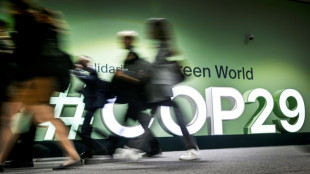
-
 Minister resigns but Dutch coalition remains in place
Minister resigns but Dutch coalition remains in place
-
Ireland won 'ugly', says relieved Farrell

-
 Stirring 'haka' dance disrupts New Zealand's parliament
Stirring 'haka' dance disrupts New Zealand's parliament
-
England's Hull grabs lead over No.1 Korda at LPGA Annika

-
 Kosovo players walk off in Romania after 'Serbia' chants, game abandoned
Kosovo players walk off in Romania after 'Serbia' chants, game abandoned
-
Kosovo players walk off in Romania game after 'Serbia' chants

-
 Lame-duck Biden tries to reassure allies as Trump looms
Lame-duck Biden tries to reassure allies as Trump looms
-
Nervy Irish edge Argentina in Test nailbiter

-
 Ronaldo at double as Portugal reach Nations League quarters, Spain win
Ronaldo at double as Portugal reach Nations League quarters, Spain win
-
Fitch upgrades Argentina debt rating amid economic pain

-
 Trump picks Doug Burgum as energy czar in new administration
Trump picks Doug Burgum as energy czar in new administration
-
Phone documentary details struggles of Afghan women under Taliban

-
 Ronaldo shines as Portugal rout Poland to reach Nations League last-eight
Ronaldo shines as Portugal rout Poland to reach Nations League last-eight
-
Spain beat Denmark to seal Nations League group win

-
 Former AFCON champions Ghana bow out as minnows Comoros qualify
Former AFCON champions Ghana bow out as minnows Comoros qualify
-
Poland, Britain reach BJK Cup quarter-finals

-
 At summit under Trump shadow, Xi and Biden signal turbulence ahead
At summit under Trump shadow, Xi and Biden signal turbulence ahead
-
Lebanon said studying US truce plan for Israel-Hezbollah war

-
 Xi warns against 'protectionism' at APEC summit under Trump cloud
Xi warns against 'protectionism' at APEC summit under Trump cloud
-
Nigerian UN nurse escapes jihadist kidnappers after six years

-
 India in record six-hitting spree to rout South Africa
India in record six-hitting spree to rout South Africa
-
George tells England to prepare for rugby 'war' against Springboks

-
 Pogba's Juve contract terminated despite doping ban reduction
Pogba's Juve contract terminated despite doping ban reduction
-
Ukraine slams Scholz after first call with Putin in two years

-
 Michael Johnson's Grand Slam Track series to have LA final
Michael Johnson's Grand Slam Track series to have LA final
-
Kagiyama, Yoshida put Japan on top at Finland Grand Prix

-
 Alcaraz eyeing triumphant Davis Cup farewell for Nadal after ATP Finals exit
Alcaraz eyeing triumphant Davis Cup farewell for Nadal after ATP Finals exit
-
Xi, Biden at Asia-Pacific summit under Trump trade war cloud

-
 India go on record six-hitting spree against South Africa
India go on record six-hitting spree against South Africa
-
France skipper Dupont says All Blacks 'back to their best'

-
 Trump pressures US Senate with divisive cabinet picks
Trump pressures US Senate with divisive cabinet picks
-
Bagnaia strikes late in Barcelona practice to edge title rival Martin

-
 High-ball hero Steward ready to 'front up' against South Africa
High-ball hero Steward ready to 'front up' against South Africa
-
Leader of Spain flood region admits 'mistakes'

-
 Swiatek, Linette take Poland past Spain into BJK Cup quarter-finals
Swiatek, Linette take Poland past Spain into BJK Cup quarter-finals
-
Leftist voices seek to be heard at Rio's G20 summit

-
 Wales coach Jenkins urges players to 'get back on the horse'
Wales coach Jenkins urges players to 'get back on the horse'
-
Zverev reaches ATP Finals last four, Alcaraz out

-
 Boeing strike will hurt Ethiopian Airlines growth: CEO
Boeing strike will hurt Ethiopian Airlines growth: CEO
-
Springboks skipper Kolisi wary of England's 'gifted' Smith

-
 End of a love affair: news media quit X over 'disinformation'
End of a love affair: news media quit X over 'disinformation'
-
US finalizes up to $6.6 bn funding for chip giant TSMC

-
 Scholz urges Ukraine talks in first call with Putin since 2022
Scholz urges Ukraine talks in first call with Putin since 2022
-
Zverev reaches ATP Finals last four, Alcaraz on brink of exit

-
 Lebanon rescuer picks up 'pieces' of father after Israel strike
Lebanon rescuer picks up 'pieces' of father after Israel strike
-
US retail sales lose steam in October after hurricanes

-
 Zverev reaches ATP Finals last four with set win against Alcaraz
Zverev reaches ATP Finals last four with set win against Alcaraz
-
Kerevi back for Australia against Wales, Suaalii on bench

-
 Spate of child poisoning deaths sparks S.Africa xenophobia
Spate of child poisoning deaths sparks S.Africa xenophobia
-
Comedian Conan O'Brien to host Oscars


Florida braces for 'extremely dangerous' Hurricane Idalia
Hurricane Idalia barreled towards the west coast of Florida on Tuesday, triggering mass evacuation orders and flood alerts as authorities warned the storm could strengthen to "extremely dangerous" levels before landfall.
The US National Hurricane Center (NHC) said Idalia, a Category 1 storm with winds of 85 miles an hour (140 kilometers an hour), was churning Tuesday morning off Florida's southwest, and bringing tropical storm conditions to western Cuba and flooding in Havana.
Warm Gulf of Mexico waters near 31 degrees Celsius (88 degrees Fahrenheit) are expected to turbocharge Idalia into an "extremely dangerous major hurricane before landfall on Wednesday," the NHC said.
Major hurricanes are Category 3 or higher on the five-level Saffir-Simpson scale, with winds above 110 miles per hour (177 kilometers per hour) that the NHC says will cause "devastating damage."
Florida Governor Ron DeSantis urged those in the evacuation areas along the Gulf coast to go "now."
"You don't have to go hundreds of miles," he told a news conference, urging coastal residents in the 23 counties under evacuation orders so far to get to shelters or hotels that were out of the danger zones.
- Marshy 'Big Bend' in path -
Almost 150 people were killed last year when Hurricane Ian slammed Florida's west coast as a devastating Category 4 storm, bringing storm surges and heavy winds that downed bridges, swept away buildings, and caused over $100 billion worth of damage.
Idalia is expected to make impact farther north along the coast, in the so-called Big Bend area -- a vast marshy region which, unlike most other coastal areas around Florida, does not have barrier islands.
"We've not really had a hurricane strike this area for a long long time," DeSantis said at a Tuesday morning press conference.
"You are going to see a lot of debris -- there's a lot of trees along that track," added the governor, who has suspended his campaign for president to handle the crisis.
The NHC said in its latest advisory that forecasts were increasingly confident Idalia would "reach the coast of Florida adjacent to Apalachee Bay Wednesday morning," and could bring "storm surge inundation of 10 to 15 feet (3-5 meters) above ground level."
In Steinhatchee, one of the small towns dotting the Big Bend, Robert Bryant was making final preparations Tuesday to evacuate inland with his two cats and a dog.
"We are out on the water, so we are going to be the worst ones to get hit," said the 18-year-old student, whose home built on stilts lies close to the mouth of a river.
"Hopefully, it just blows over and we have a bit of wind... but you prepare for the worst and hope for the best."
US President Joe Biden spoke with DeSantis on Monday and approved an emergency declaration for the state, promising it would have his full support, a White House spokesman said. The US Federal Emergency Management Agency (FEMA) has also deployed staff.
The Tampa International Airport has closed for the storm while the nearby US Air Force base has ordered a mandatory evacuation of "non-mission essential individuals and dependents."
- 'Marine heat wave' -
Georgia and South Carolina are also under storm watches as the system is expected to cross northeast over Florida before exiting into the Atlantic.
Flash and urban flooding may hit parts of Florida and southern Georgia into Wednesday, the NHC said. Flooding could reach parts of South Carolina Wednesday into Thursday.
On Monday thousands of Cubans rushed out of the storm's way as the provinces of Pinar del Rio and Artemisa as well as Isla de la Juventud, an island, were placed under hurricane warnings.
Streets were flooded in Havana and some of the island nation's western provinces as Idalia brushed past.
After clipping Cuba the storm moved out over the Gulf, which scientists say is experiencing a "marine heat wave" -- energizing Idalia's winds as it races towards Florida.
On Monday, Idalia dumped rain on Mexico's state of Quintana Roo, home to Cancun and other coastal tourist resorts.
Scientists have warned that storms are becoming more powerful as the world gets warmer due to climate change.
burs-des/st
O.Krause--BTB



